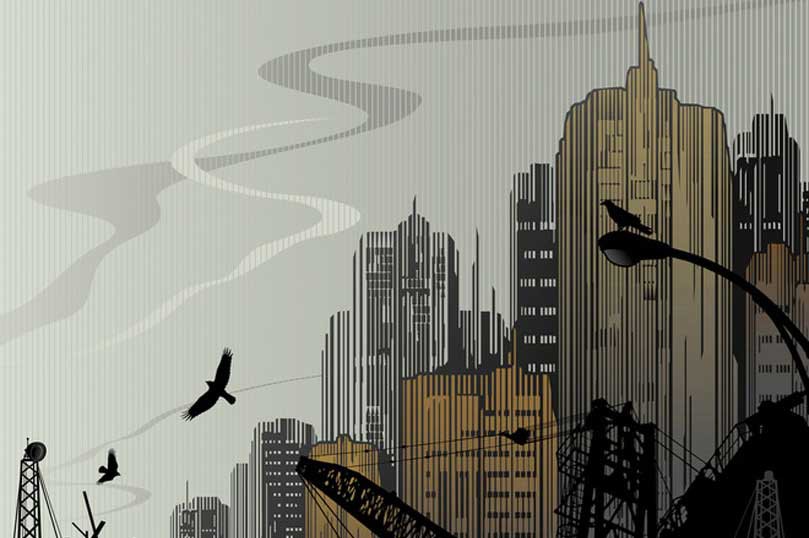Metatropolis is a short fiction anthology edited by John Scalzi. I’ve alluded to it a few times here. It’s worth giving it’s own post. Structurally there are a few interesting details about this collection, namely that it was originally commissioned as an audiobook for Audible, and then later released as text. It also take an approach to world building which I’m somewhat surprised hasn’t been taken more often, in creating a shared world which multiple authors flesh out stories within. In this case the five authors commissioned by Scalzi are Jay Lake, Tobias S. Buckell, Elizabeth Bear, Karl Schroeder and Scalzi himself. All contribute interesting stories and judging by the varied reviews various readers will find different stories to love. Sadly Jay Lake has passed away since publication. His novella “In The Forests Of The Night” is a provocative visit to his deep green eco-future of Cascadia in which people live in high tech, low footprint style as anarchists in the forests of the pacific north west. I don’t intend this piece as a review so I won’t catalog the stories, instead I’ll just focus in on a few pieces and concepts that really got me thinking.
Tobias Buckell and Elizabeth Bear’s stories overlap in that they share the concern of retrofitting urban areas for a post carbon world. Buckell’s description of an urban green revolution in downtown Detroit which embroils a down at the heels ex-military nightclub bouncer is really wonderful. I hope you read it so I won’t spoil the plot, but in the story Buckell takes us into a world in which carbon funded sprawl has effectively collapsed but info-tech has continued to accelerate, enabling people’s movements to take on the government and corporations using techniques taken from both guerrilla insurgency and civil disobedience. I wouldn’t classify it as exactly predictive but it’s a compelling look at an interesting moment in a possible energy descent future. The old order has an entrenched interest to maintain the valuation of all the decayed infrastructure based on the idea that somehow carbon based civilization will rise again and return to business as usual, whereas the new order needs to repurpose, retrofit and consume what has been effectively abandoned and rendered obsolete. This is a major concern of Permaculture co-creator David Holmgren’s book “Retrosuburbia” which is essentially about retrofitting the suburbs into low-energy human friendly habitats in a world of receding carbon subsidy. His outlook is a bit less dramatic and apocalyptic but the question of what to do with all of the left behind buildings and infrastructure that can no longer be supported by cheap energy is one that our society may well have to grapple with. Buckell and Bear’s stories, set in these retrofitted urban environments offer jumping off points for thinking about these questions.
Without slighting the other great stories in the collection, the second story I want to talk about which I found absolutely mind blowing is the last, Karl Schroeder’s novella To Hie From Far Cilenia. It shares a bit less of the solar-punk post-carbon theme of the other stories but takes an absolutely fascinating sideways look at what cities may mean in the future. Again, I don’t want to spoil it as I urge you to read it but basically the story follows a nuclear weapons inspector as he gets drawn into a multi-layered series of AR worlds, layered over the existing physical infrastructure. Players of Pokemon Go or Ingress will recognize the rudiments of this, but Schroeder takes things much further. Basically the protagonist begins to explore one world, a steampunk gameworld in which players meet up in real life physical space while looking through AR glasses that layer the game environment on top. They play politics, deliver packages and do quests, all fairly familiar massively multiplayer video game stuff. Where things get interesting is that it is revealed that there is another world which is only accessed by achieving an invitation to a certain restaurant in the first game world. The restaurant exists in the real world and serves real food, but the food is provided and manufactured by people who have removed themselves from the real world economy and exist only in the next layered game economy. They run urban farms, provide living space and have the infrastructure of a distributed city which is hidden and superimposed on the real city. It’s only discovered and accessed by people with the correct connections, social and virtual capital. As you may be able to tell from my short description, the story is mind bending.
As someone who spends a fair amount of time at the intersections of all these concepts and technologies: games, AR/VR (or XR as people now say) and virtual currencies this concept is tantalizing because it’s sort of at the tip of the world’s tongue. The cryptocurrency space exploded into popular consciousness this past year and took a lot of flack for some of it’s more unsavory gold-rush type characteristics and characters (which is fair IMO). That being said it represents an enormous proof of concept for the idea that if we create cryptographically secure mediums of exchange and stores of value, millions of people are willing to agree that this is some kind of ‘real money’ and act accordingly. This, combined with the release of technologies like the Magic Leap, Holo Lens and the current tech world focus on AR (augmented reality) platforms means that all or most of the technologies which this story posited nine years ago are more or less real today. We already organize ourselves into various affinity networks and constellations using the internet, and some of the most central and visible people in those networks use the resources of the network to support themselves via things like Patreon. The idea that these types of networks might take on this increasingly physical / virtual parallel city manifestations is a really interesting one to me. Eric Schmidt, former CEO of Google already wrote about these phenomena on the national level in his book “The New Digital Age: Reshaping the Future of People, Nations and Business”, positing that the geographical nation state may be supplanted by a kind of virtual, voluntary nation state in which people subscribe with ‘taxes’ to an entity which provides nation-like services to them. The idea of creating voluntary virtual networks that begin to supplant the functions of currently existing society only becomes increasingly more plausible, and I think in terms of loosening the grip of the nation state on economic and political power may be a good thing.
There’s a lot more we could dig into, any maybe I will in a future post, but in short: go read or listen to Metatropolis. There’s tons in there to think about and overall it’s just a great, entertaining and thought provoking collection of short fiction.





